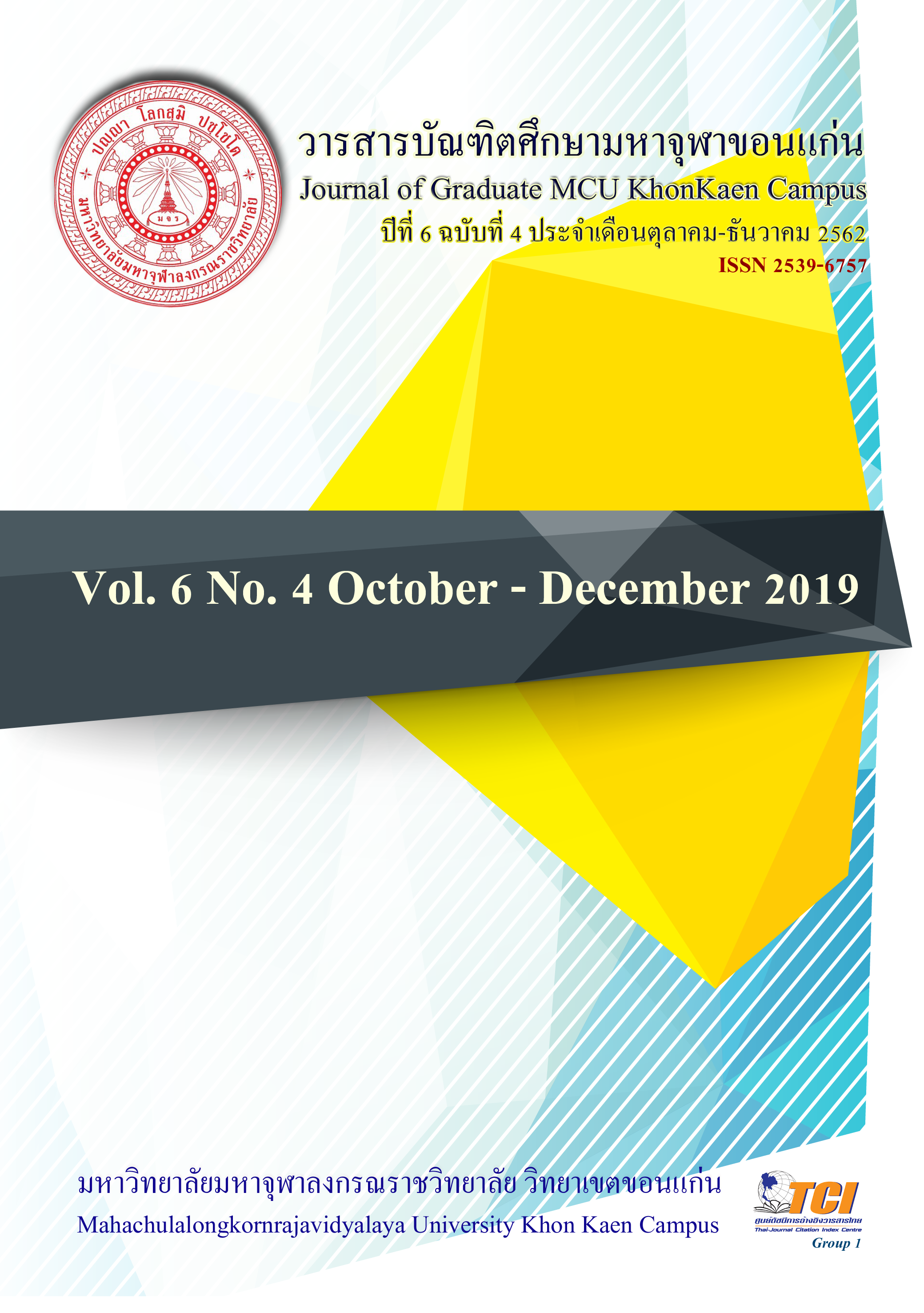Buddhist Methods for Learning Management on the Social Studies, Religion and Culture Studies Department of Secondary Schools under Khon Kaen Municipality
Main Article Content
Abstract
The aims of this research were: 1) to study Buddhist methods for learning management on the Social Studies, Religion and Culture Studies Department of the secondary schools under Khon Kaen Municipality; 2) to compare the mentioned Buddhist methods of learning management; 3) to present the ways to develop the Buddhist methods of learning management. This quantitative research was conducted with its 345 samples who responded the questionnaire. The statistics used in data analysis were: Frequency, Percentage, Mean, Standard Deviation, t-test (Independent Samples), f-test (One Way Analysis of Variance) and Scheffe’s Least Square Difference.
The research results were as follows:
1) The statistic scores of the Buddhist methods for learning management on the Social Studies, Religion and Culture Studies Department of the secondary schools under Khon Kaen Municipality in both overall and each aspect perspectives were at a high level. All aspects: Curriculum, Learning Management, Measurement and Evaluation, Student Development Activity Management and Media Use in Learning and Teaching were rated at the sample level.
2) Based on the comparison of the student opinions on the mentioned Buddhist methods for learning management, classified by the sample factors: levels of education, school sizes and parent occupations, the statistic scores of the student opinions were different with the significance level of .05; this therefore accepted the set hypothesis.
3) The ways to develop the Buddhist methods of learning management are that teachers should have a teaching method that integrates with the environment, society, culture and local wisdom consistent with the current social situation, which can be applied to life. The teachers should use a variety of teaching methods, technology, media and modern equipment suitable for learning management. They should develop media and create new innovations that allow students to improve their thinking, analyzing and learning in a real place. They should encourage students to express their talents, aptitudes and interests. Teachers should measure and evaluate the students according to actual conditions and evaluation results should be used to improve teaching methods and to develop learners to their full potential and to have the knowledge which can be applied to life and to have successful career in the present day.
Article Details
References
Kanthapond Pan-ngern. (2016).The Development of Learning Activity Package to Develop the Ability to Live in a Self-Sufficient Community with Critical Thinking about Chantaboon Waterfront by Social Study. Religion and Culture Group of Mathayomsuksa 2 at Streemandapitak School. Chanthaburi : Rambhai Bani Rajabhat University.
Ministry of Education. (2008). Learning Management on Buddhisn in Social Studies, Religion and Culture. Bangkok:Bureau of Academic Affairs and Educational Standards Office of the Basic Education Commission Ministry of Education.
Ministry of Education. ( 2009). Basic Education Core Curriculum A.D. 2008. Bangkok : Bureau of Academic Affairs and Educational Standards Office of the Basic Education Commission Ministry of Education.
Phra Prasatsin Sirimangalo (Kanbut). ( 2017). Buddhist Teaching Method in Learning Buddhism Subject of Secondary Schools Sathorn District, Bangkok. Graduate School : Mahachulalongkornrajavidyalaya University.
Phra Thanong Jayãbharano (Wongsaya).( 2011).Learning and Teaching by Means of Buddhist Way of The Primary School of Naamdib Shool Laphun Province. Graduate School : Mahachulalongkornrajavidya
laya University.
PhraSakda Aggapañño (Nganman).(2017).The Promotion of Learning Management by Self-directing of the Students in Phrapariyattidham School, Nakhonratchasima Province. Graduate School: Mahachulalongkornrajavidyalaya University.
Prawet Wa Si. (2003). The human way in the 21st century to a new landscape of development. Journal of Health Medicine, 12(4)
Sriprai Chankhiaw. (2015). Learning Management on Buddhisn Through Integrated Buddhist Methods. Graduate School : Mahachulalongkornrajavidyalaya University.
Sukon Sinthapanan.(2015). Learning management of modern teachers To develop learner skills in the 21st century. Bangkok : 9119 Technical Printing Partnership.
Sumon Amornwiwat.(2004). Development of Buddhist-based learning: situational process skills. Bangkok : Sukhothai Thammathirat Open University.
Venerable Phra Dhammapitaka (P.A. Payutto). (1997). Buddhism, people and society development. Bangkok : Local Printing
Vichai Tansiri. (2004). The face Thailand in the future : the concept of reform in the Education. Bangkok : Publisher of Chulalongkorn University.
Vipaphan Pinla. (2017). Guidelines for learning management in social studies To develop critical thinking skills for learners in the 21st century. Parichat Journal, 30( 1)

